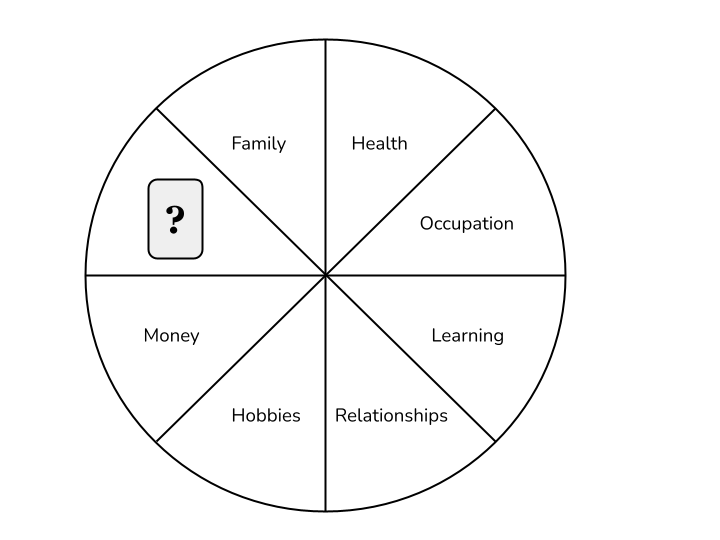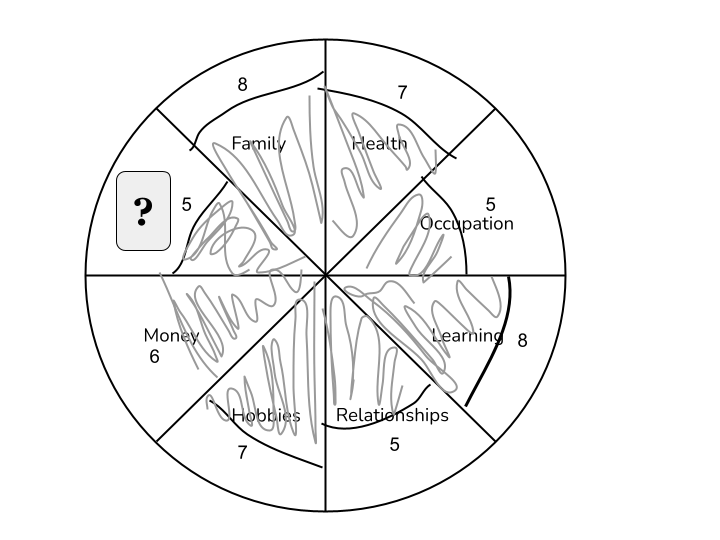Enjoy this blog? Get email notifications for new posts by following us.
Self-Reflection: The Wheel
Today, I’ll discuss how you can use a Life Balance Wheel (aka the Wheel of Life), a tool commonly used in coaching, to assess how things are going in key areas of your life and where you might want to make some changes. Now, I haven’t been a big fan of setting New Year’s resolutions because I believe in continuous improvement, but I’ll admit that the beginning of the year is a nice time to wipe the slate clean and start some new habits.
Happy almost New Year! In my last post, I shared a simple template for a Retrospective, or look back, that you can use at the end of the year (or at any time) to learn from your experiences, both good and bad. I did my own retrospective this week and one thing really stood out to me. While I’ve been saying that 2022 was a terrible year and I can’t wait for it to be over, when I actually listed out what went well and what could have gone better, the positives outweighed the negatives. By a lot.
That tells me that even though I sometimes felt like I was in the depths of despair due to things going on in my life and the world in general, and though I felt weary and beaten down by a never ending stream of More Bad News, I have so much to be thankful for. And since research links gratitude to well-being, I have a lot on my side in my pursuit of happiness.
Today, I’ll discuss how you can use a Life Balance Wheel (aka the Wheel of Life), a tool commonly used in coaching, to assess how things are going in key areas of your life and where you might want to make some changes. Now, I haven’t been a big fan of setting New Year’s resolutions because I believe in continuous improvement, but I’ll admit that the beginning of the year is a nice time to wipe the slate clean and start some new habits.
Maybe you aren’t sure where to start, but have a feeling that you want to change something. The Wheel can help you hone in on the areas of your life where you might not be totally satisfied and would like to be happier. If you haven’t already, I recommend that you do a retrospective first, since that tends to bring up things that are top of mind for you, before doing broader assessment using the Wheel.
It’s a pretty simple exercise that you can do in a short amount of time. Start with a blank piece of paper and draw a circle. Then divide it into eight sections by drawing a line down the middle vertically, another horizontally, and two more diagonally.
You can also download this printable worksheet.
Then label each pie piece of the circle with one of these categories
Health
Occupation
Learning
Money
Relationships
Family
Hobbies
But wait, you say. That’s only 7 categories! What about the 8th pie piece? This is your wild card, reserved for any other core area that is meaningful to you - spirituality, religion, service, giving, or something else unique to you.
Now that you’ve set up your categories, focus on one at a time. On a scale of 1 to 10 where 1 is least satisfied and 10 is totally satisfied, rate how satisfied you are in this area right now. Consider the questions below and then write down your number inside each pie piece.
Health
You can define this however you want so that it’s meaningful to you. Consider your physical health, and aspects of health that are important to you - for example, medical conditions, fitness or other activity, nutrition, sleep, hydration, etc. This could also include mental and emotional health - how well are you able to process information and think clearly, and make good decisions? How well do you cope with and manage your emotions?
Occupation
No matter what you do, everyone has an occupation. Perhaps it’s your career or job, paid or unpaid. Or you might be a student or trainee in school, university, or a training program. Or maybe you are a philanthropist, volunteer, or full-time parent. Are you doing what you want to be doing? If not, are you taking any steps toward what you want? If you are already doing it, how’s it going?
Learning
This is important for a sense of progress, and could also be called personal growth or self-development. Consider the level and quality of learning. And what are you learning? Keep in mind you can learn in a variety of ways - classes, training, videos, books, experiences, self-guided or with a teacher, etc. This could be related to your occupation or hobbies.
Money
This area is about more than just how much money you make or your net worth; it’s about your sense of prosperity in the world and in life. Can you afford the things you need in life to survive and thrive? Perhaps you are saving towards a major purchase or for retirement. Do you have debt that you are paying down, or accumulating more of? Do you set aside funds to Treat Yo Self?
Family
This could be your children, or your family of origin, or your partner or spouse. Are you able to spend enough quality time with your family? How is your home life? Are you keeping in touch with family who doesn’t live near you?
Relationships
Similar to family, this is about having friendships and intimacy in your life. Do you have people that you enjoy spending time with? When you want to share about your life and work, or discuss a problem you are having, who comes to mind? Who would you call if you needed help with something?
Hobbies
This can be anything you do for fun, leisure, or recreation. What do you like to do when you’re not working or taking care of other obligations? Some of my hobbies overlap with health because they include working out and yoga. I also enjoy cooking and baking, and consider that a hobby since I don’t do it every day.
Ask yourself similar questions about your wild card category. And if any of these areas are not important to you, feel free to omit them. This is about what matters to you.
After rating each area, graph your satisfaction, draw a line (or arc) in your pie piece where 1 is closest to the center and 10 is at the outline of the circle. If you like, you can shade in your pie piece. When you’re done, it will look something like this:
Now it’s time to reflect on your Wheel. Take a look at all the areas in your Wheel and consider that they are all part of a system, and they all contribute to your overall satisfaction, success, happiness, and well-being. What do you notice? Maybe you’re firing on all cylinders and everything is great. Or maybe you’re dissatisfied in a lot of areas, or there are a couple that really stand out to you. Is there an area in particular that, if you could improve it, would make everything else better? As you identify areas of low satisfaction, you might dive deeper into what part of it is problematic and what specifically you want to change.
You have the opportunity in the New Year to do some things differently. What will you resolve to change? Consider sharing this with a friend or family member to get their thoughts, and to help keep you accountable.
Stay tuned for my next post, where I’ll discuss the Formula for Change to help you increase your chances of success.



